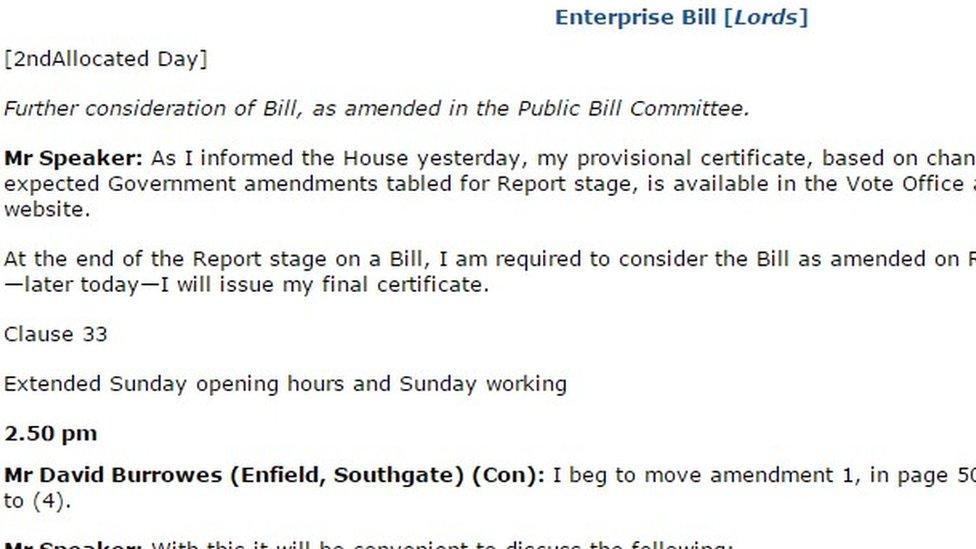The whys and wherefores: Sunday Trading and EVEL
- Published
- comments

From Hansard - the beginning of the debate on the Enterprise Bill
Like a circle in a spiral, like a wheel within a wheel, the procedural tangles created by EVEL - English Votes for English Laws - continue to baffle MPs.
This week's Commons debate on the Enterprise Bill saw ministers bewildered, and indeed Deputy Speaker Lindsay Hoyle openly admitted he didn't know what was going on.
And outsiders might have been pretty confused, too.
For a start, why did an amendment to change the rules on Sunday Trading in England and Wales not invoke EVEL?
Well, the clause it applied to dealt with employment rights, which are a UK-wide issue. For the powers of EVEL to be called down upon the Commons, the issue involved must (1) arise in a government bill, (2) apply only to one segment of the UK (England or England and Wales, say) and (3) deal with a matter where the devolved legislatures could pass an equivalent statute, if so minded.
These rules have a number of interesting implications - for example, Scottish, Welsh and Northern Ireland MPs would have a vote on a private member's bill to designate an English national anthem.
But back to Sunday trading - and that clause fell foul of the third condition, because its drafting bundled a right to opt out of Sunday working together with devolving the regulation of trading hours to local authorities. That combination was the actual stumbling block here. Mr Speaker has to certify bills as subject to the EVEL rules clause by clause....
So the whole clause had to be exempt.
I don't know if this was accident or design, but it certainly highlights an area where a government could game the EVEL rules and try to ensure that certain clauses were not eligible for the process.
Another EVEL point is that, although the removal of the clause on Sunday trading would not have happened but for Scottish votes (if Scottish MPs had abstained from the division, the government would have had a majority of 21), the EVEL rules (and there are 30 pages of Commons standing orders setting out the procedure) provide no way of putting it back.
The English Grand Committee, which is the vehicle for English-only voting, can block parts of a bill, but not add to it.
At least in this Parliament, where we have a government whose majority rests on English MPs, it is very hard to see EVEL being deployed to amend a bill; a future government would have a harder time if it did not have a majority of English MPs, but for the time being, its little more than a parliamentary ritual.